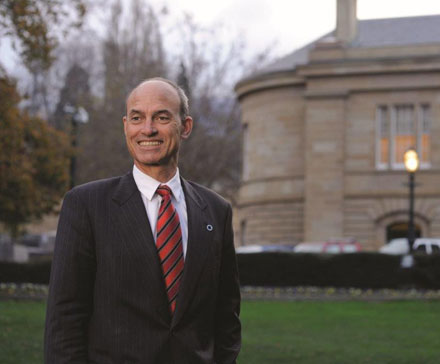
Guy Barnett
A deal to sell Tasmania’s 29,000ha of pulpwood plantations for $60.7 million has been described as a strong outcome by the State Government — and a “fire sale” and “rip-off” by opponents. Sources: The Mercury, ABC News
Questions have also been raised about the company, which Parliament heard had been registered only two months ago and had a parent company listed in the Cayman Islands.
The long-awaited deal was announced via a Facebook post by Resources Minister Guy Barnett, who was criticised by the ALP and Greens for not fronting the media to answer questions.
The Government said the sale would add to Sustainable Timber Tasmania’s bottom line, but net proceeds of about $15 million would be diverted into Tasmania’s health system.
The sale of plantations was first flagged by then resources minister Paul Harriss in April 2015 as a way of keeping Forestry Tasmania solvent, without public subsidies. But Labor leader Rebecca White accused Mr Barnett during question time of a “fire sale” and a making a “dud deal” at a loss to taxpayers.
Health Minister Michael Ferguson said the $60.7 million figure was significantly more than government advisers had expected to secure, but he did not provide the predicted amount.
“It’s a great outcome for Tasmania,” he said.
Mr Ferguson said the Government had not sold the land, just the trees. But Greens leader Cassy O’Connor and Ms White said the deal amounted to privatising a public asset because it included a 99-year lease.
Ms White said it cost taxpayers $90 million to put the trees in the ground and recent sales of similar plantations had fetched much higher amounts per hectare.
A similar sale could have netted taxpayers close to $200 million, she said.
Greens leader Cassy O’Connor said the deal was a “rip-off,” citing a 2012 letter in which the Auditor-General accepted figures estimating the cost of establishing the plantations was more than $100 million.
Ms O’Connor said the purchaser, Reliance Forest Fibre, was registered in Australia two months after final bids for the plantations closed and had a parent company listed in the Cayman Islands.
“There are legitimate questions to be asked about this company,” she said.
While this is GFP’s first venture into Tasmania, the international timber giant has operated in Australia since 1999.
The US-owned multinational corporation currently managed funds that hold about 150,000 planted hectares on mainland Australia.
Health Minister Michael Ferguson said there shouldn’t be any doubt over the buyer.
Forestry Tasmania became Sustainable Timber Tasmania in July this year. When it was officially launched in late July, Mr Barnett said the entity had selected a preferred bidder to buy the plantations.
The launch was 11 days after the company that bought the plantations, Reliance Forest Fibre, registered with the Australian Securities and Investments Commission.
The sale of the plantations was listed as a risk by Treasury in this year’s state Budget because it was impossible to know whether the proceeds would be a enough to support the restructure of Forestry Tasmania into Sustainable Timber Tasmania.
The Government has not provided a figure for the cost of the restructure.





